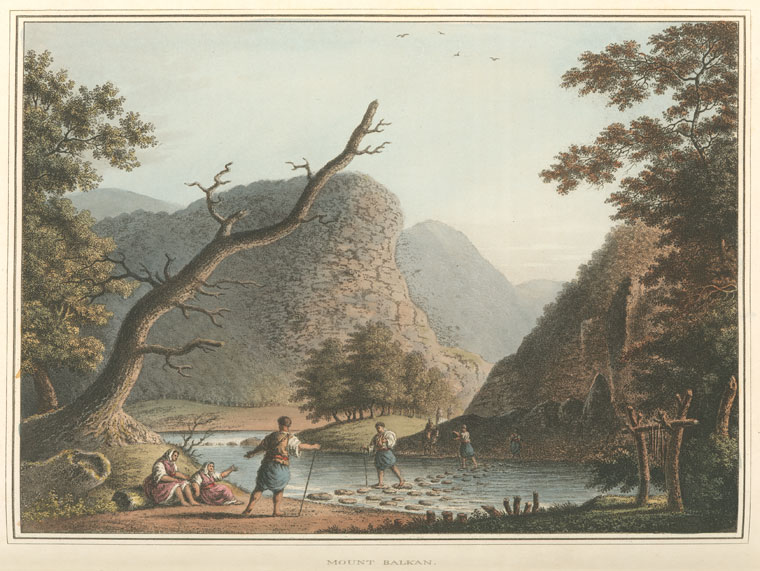In various European languages, the word Balkan means either a mountain in the singular or a peninsula in the plural. Also, its use is also present in the Balkans. In Bulgaria, it has a triple meaning: the mountain, the Stara planina massif and the Balkan region.
The most important term derived from the word Balkan is “balkanization”. It is most often used to denote the process of dismemberment of previous geographical and political entities on a national basis into new ones.
 The Miriam and Ira D. Wallach Division of Art, Prints and Photographs: Print Collection, The New York Public Library. (1810). Mount Balkan Retrieved from https://digitalcollections.nypl.org/items/510d47d9-60ec-a3d9-e040-e00a18064a99
The Miriam and Ira D. Wallach Division of Art, Prints and Photographs: Print Collection, The New York Public Library. (1810). Mount Balkan Retrieved from https://digitalcollections.nypl.org/items/510d47d9-60ec-a3d9-e040-e00a18064a99
The term “Balkanization” appeared after the First World War: it was first mentioned in the New York Times on December 20, 1918. Under the title “Ratenau”, the great industrialist predicts the “Balkanization of Europe”. Ratenau used the term “Balkanization” to describe fears of an almost apocalyptic future. He does not mean anything definite by “Balkanization”, except to imply that only a strong and powerful Germany could counterbalance that terrible prospect. After the First World War, the word “balkanize” was introduced with the meaning “to break into small, quarrelling political entities, similar to the Balkans after the First World War”, which is absurd.
The term “Balkanization” is retained and used even in the 60s of the 20th century, when African countries began their struggle for independence from France, and even when expressing dissatisfaction with internal conditions. In his criticism of Austrian institutions, Aleksandar Vodopivec says that the term “Balkan” as a synonym for corruption, lethargy and irresponsibility has been transferred beyond the geographical borders of this region. A similar use of this term is found even in the USA, where it acquires the meaning not only of fragmentation of states but also of a general dehumanization and destruction of civilization.
Why was the adjective “Balkan” torn from its ontological basis and re-created as an abstract demon, despite the wealth of concepts, words, and sounds? Why has it been turned into a linguistic weed? This rhetorical question is based on the belief that the ontology of the Balkans cannot be identified with the idea that stems from the use of the adjective “Balkan” and the verb “balkanize” in the vocabulary of today’s politics and culture. On the other hand, the complete decontextualization of this term and its upside-down application are the result of a rather simple pair of syllogical constructions. The first is of an extrapolative nature: the Balkans as a reality has acquired a reputation that is far from praiseworthy; there are many undesirable and tasteless phenomena that resemble patterns from the Balkan reality or, most often, constructed images of the Balkans. The second syllogism is essentially interpolative: the attribute “Balkan” is harmful.
The word “Balkan” in many ways prefigures the nomen nudum (this term means “a name that does not yet have a legitimate place because it has come into use without first being described in detail in a way that and require the rules of botanical and zoological nomenclature).
by Omer Merzić, MA
Dobra knjiga